- Home
- William Golding
The Scorpion God: Three Short Novels Page 3
The Scorpion God: Three Short Novels Read online
Page 3
The Head Man was nodding and smiling.
“Your lovely Daughter.”
Great House raised a hand in greeting. Smiling over her shoulder, Pretty Flower turned her back in exquisite time to the music and another shawl came off as the shining fall of hair swung femalely from hip to hip. Along the tables the roar had changed in quality to accord with the God’s smile and wave. There were affectionate smiles everywhere, gentle cooings, a delighted welcome for Pretty Flower into the family. The reed instrument and the harp joined the drum.
“She’s grown, you know,” said Great House. “You wouldn’t believe how much she’s grown!”
The Liar tore his attention from Pretty Flower, licking his lips. He leaned towards Great House and came near to nudging him.
“That’s better than hard water, eh, Great House?”
But the God’s eyes had focused a long, long way beyond his daughter.
“Tell me some more.”
The Liar frowned and thought. He came to some decision. He bent his bony face into a salacious grin.
“Customs?”
“Customs? What customs?”
The Liar whispered.
“Women.”
He hunched himself still nearer and began to whisper behind his hand. The God’s eyes became intent. He smiled. The two heads moved closer and closer together. The God reached behind him and brought another dish of beer to his mouth without looking at it. He sucked. The Liar began to shake with a prolonged snigger and his words came out from behind his hand.
“—sometimes they’ve never even seen them before—strange women!”
Great House snorted, and sprayed the Liar with beer.
“You can tell the most dirty——”
The Head Man coughed once more, with severe meaning. The rhythm of the music had changed. The reed instrument seemed more nasal, more plangent as if it had discovered something it wanted but did not know how to set about getting it. Pretty Flower had changed too. She was nakedly visible above the waist and she moved more quickly. Once, her feet had been all that moved. Now they, and her head, were all that was still. Her smile had gone, and she inspected her breasts, one at a time. For example: she would stand, right arm across her face, forearm down, palm outward and indicating her left breast, while her left curved to indicate it from below. Thus, her breast was delineated by two palms, offered, as it were, and made to pulse and quiver gently by a subtle rotation, of the left shoulder so that its warmth and weight and scent and texture was evident. Then bonelessly, she would evolve into a mirror image, this time concentrating on her right breast. It was now, with a brace of crimson nipples shaking out a perfume into the heavy air, that the reed instrument began to understand what it wanted. The nasal tone became a more than human cry. This cry was taken up along the tables, where there was some kissing among the drinking and a little delicate pawing. The Liar’s head turned slowly, compelled from Great House. His mouth was pinched as if with thirst.
“She’s beautiful,” he groaned. “Beautiful, beautiful!”
“She is indeed,” said the God. “Tell me some more, Liar.”
The Liar groaned in agony.
“You must watch her, Great House—don’t you understand?”
“There’s plenty of time for that.”
Pretty Flower was doing things with both breasts. Her hair flashed and floated wildly. The Liar was torn between her and the God. He beat his head with both hands.
“Very well,” said Great House sulkily. “If you won’t tell me any more I shall play checkers with the Head Man.”
The board appeared at once, like the beer. As Great House leant over it and shook the dicing sticks in the cup, a change came over the tables. There was less pawing, more muted conversation about food and drink and social matters and games. Pretty Flower and the musicians seemed to be performing to themselves, or the air.
“Your move,” said Great House. “Good luck.”
“I’ve sometimes thought,” said the Head Man, “it might be interesting if we didn’t let chance decide the moves but thought them out for ourselves.”
“What an odd game,” said Great House. “It wouldn’t have any rules at all.”
He glanced up, saw Pretty Flower and gave her a quite charming smile before he looked down again. She was indicating the smallness of her waist and the complex bearings of her hips which were moving in a slow circle beneath the last shawl. If there was any expression to be read behind her elaborate make-up it was one of anxiety, turning to sheer desperation. As she went into each new figure of the dance, she prolonged it, as if to enforce the invitation by sheer strength. She gleamed with more than unguents.
This was hard on the musicians. The harpist raked at the strings with the insistence of a woman rubbing out meal between two stones. The reed player’s eyes were crossed. Only the drummer beat easily, changing hands now and then, using two sometimes, sometimes only one. Along the tables, the talk was of checkers or hunting.
“Your move, Head Man.”
The Head Man shook his head and the dicing sticks at the same time. The Liar, greatly daring, was tugging at the God’s skirt for attention. The last shawl had come off Pretty Flower. She was naked and shining except for her jewels. Her mouth, drawn down at the corners in a stylized grimace of desire, had set round her gleaming teeth. She went into her last figure. This began at the other end of the hall, and brought her—the music commanding it and giving it power—in a series of convulsions down the whole length. Every few yards it threw her into display, arms out, knees apart, belly thrust forward. It brought her down the hall from a Now to a Now to a Now. Her thighs struck the God who struck the checker board and the ivory pieces flew in every direction. The God jerked back angrily and stared up.
“Do you mind?”
Then there was silence along the tables, silence from the collapsed musicians, silence from the dais where the ivory pieces had ceased to roll, and the only things that moved were the breasts of Pretty Flower. She fell, collapsed on the floor of the hall, face downward.
Great House moved, the anger dying out of his face. He passed the back of his hand across his forehead.
“Oh yes. Of course. I forgot.”
He swung his legs off the couch and sat on the edge.
“You know, I——”
“Yes, Great House?”
Great House looked down at his daughter.
“Very good, my dear. Most exciting.”
The Head Man leaned close.
“Well then——”
The Liar was hopping and desperate, between Pretty Flower and the couch.
“You must, Great House! You must!”
Great House had either hand laid on the couch beside him. He braced his hands, stiffening the muscles of his arms. He drew himself up, drew his stomach in, so that some faint indication of a muscled torso appeared beneath the quivering thickness. He stayed so for a few moments.
“Great House—please! Dear Great House!”
The God let out his breath. His eyes unfocused. His body slumped between slackened arms and his insides bulged out slowly into a smooth and rounded belly. He spoke flatly.
“I couldn’t.”
The sound of indrawn breath was like the flyby hiss of a monstrous arrow. Not a face in the hall but stared down. Not a finger or an eye but was motionless.
Suddenly Pretty Flower scrambled to her feet. She hid her face in her hands and fled shuddering and stumbling down the length of the hall and the curtains swung together behind her.
A young man came hurrying from the shadows at the back of the dais. He bent and whispered in the God’s ear.
“Oh yes. I’ll come now.”
The God got to his feet and the hall rustled as everyone else got to their feet too; but all faces still stared down, all mouths were silent. Great House followed the young man through the shadows and out into the open. Over the courtyard night was growing heavy at the zenith, oozing down and uncovering a myriad skypeople as it came. Beneath the creep
ing night and nearer to the horizon the sky was lighter blue, fragile, hardly able to bear the impending weight. Great House paused only to glance round at the fragility, whistled softly, then hurried to one of the four corners. He muttered to the young men as he went.
“I’ve cut it fine tonight, haven’t I?”
In the corner was a low altar built against the wall. Great House cleaned himself with holy water as he gazed round him apprehensively at the darkening sky. He dropped a pinch of incense on the glowing charcoal, then muttered a few words so that a thick column of white smoke pushed up into the darkness. He went hurriedly to the other three corners and made more columns. He stood for a while checking on the columns; then turned away to go back to the banqueting hall. As he went he muttered again, either to himself or the young man.
“At least I can still keep the sky up.”
In the hall, the guests were ranged behind the tables, looking down, and saying nothing. The Liar knelt by the couch, his hands fastened to one of the legs as if it would save him from drowning. Great House heaved himself on to the couch and lay on his side.
He spoke.
“I should like a drink.”
But before anyone could move, the Head Man had caught him by the wrist and was speaking to him through his quiet smile.
“Don’t you understand, Great House?”
Great House turned to him. His solid face quivered.
“Understand?”
“This morning you fell. This evening——”
Great House caught his breath. Then he began to laugh.
“You mean, it’s a beginning?”
“Just so.”
The silence behind the tables broke up. There was a sudden gust of whispers.
“A beginning! A beginning!”
The Liar let go the leg of the couch, grabbed at the curved head, knelt there, eyes shut, head up. He shouted.
“No! No!”
But Great House still laughed. He swung his legs off the couch and sat there, laughing and speaking directly to the assembly.
“Strong beer and no hangover!”
The Head Man smiled and nodded.
“Beautiful, changeless women——”
The Liar began to babble at the God.
“Of course, Great House! What else does any man need? Beer and women, women and beer, a weapon or two—what else does anyone need?”
“His potter,” said the Head Man. “His musicians. His baker, his brewer, his jeweller——”
Great House tweaked the Liar’s ear.
“And his Liar.”
The Liar’s babble ran up so that all other sound in the hall died away. The Head Man patted him.
“Calm yourself, my dear Liar!”
The God looked down at him, his smile broadening. He was in high good humour.
“What’s all this? I simply couldn’t do without you!”
The Liar screamed once. He leapt to his feet, glaring round him. Then he was off, sprinting down the hall. He dived over the musicians and took one of the curtains with him. There was a scuffle and a series of thumps, soldier-sounds, blows. There were orders. The Liar yelled again.
“I won’t!”
The scuffles and thumps receded down the corridor; and once more, but fainter this time, the assembly heard the Liar, shouting in terror and indignation.
“You fools! Can’t you use models?”
Nobody moved. Every face in the hall was flushed with shame. The darkness where the curtain had been torn down was like an obscene wound in the fabric of life itself.
At last the Head Man broke the silence.
“No more tiredness.”
Great House nodded.
“And I shall make our river rise. I swear it.”
Now, along the tables, people began to laugh and weep.
“Forgive your Liar, Great House,” murmured the Head Man. “He is sick. But you shall have him.”
The guests were beginning to move towards Great House from the tables. They wept and laughed and stretched out their hands. Great House dashed a tear from his eye.
“Dear family! My children!”
The Head Man cried out.
“Bring Great House the key!”
The guests moved into two groups that left a passage down the hall. Presently, from the darkness beyond the place where the curtain had been, a little, old woman came veiled and slow and carrying a dish. She gave it to the God, then turned aside into the shadows. Great House received the drink and laughed with excitement. He held the dish up with both hands. He cried out in a loud voice.
“To keep Now still!”
He drank and drank, tilting back his head; and softly, with tiny shuffling steps and a muted clapping of hands the guests began to dance. As they danced, they began to sing, nodding and looking at each other with shining eyes.
“The river is filled to the brim.
The blue flower lies open;
Now moves no longer.”
Great House lay back on the couch and closed his eyes. The Head Man leaned over him moving his limbs, setting his knees together, smoothing down the rumpled kilt. The musicians began to play, catching the time from the dancers. The dance quickened and the God smiled in his sleep. The Head Man took his arms and folded them across each other so that they lacked nothing but the crook and flail. He tried the pulse in the left wrist, listened, ear against chest, for breathing. He stood up, moved to the end of the couch and slid the pillow from beneath the sleeper’s head.
“The river has risen and will not fall” they sang. “Now is forever!”
They were moving in a complex weave that sorted itself little by little into concentric circles. The lamps flickered in the wafts of hot air. Servants and soldiers filled the spaces of the doors. Kilts and transparent dresses stuck to flying limbs.
The Head Man stood behind the couch and faced the dancers. He lifted his hands. The dance stilled, the music fell silent, instrument by instrument. He beckoned and soldiers and clean men pushed through the crowd. They formed round the couch, then lifted it easily. They bore it through the hall and away into the deeper and darker mysteries of the Great House. Then the guests went silently, not looking back. The banqueting hall was empty of all but the Head Man. He stayed where he was, looking at the lamps and smiling faintly. Presently, he too went away to sleep.
Only one part of the Great House remained awake. This was an upper terrace that fronted the distant river; and here, a group of women crouched, saying nothing, but staring in silence at the girl who lay sprawled in her hair with nothing but one snatched-up shawl to cover her naked body. There was tension in her every limb. The forearm on which her smeared face lay, ended in a frenetically clenched fist that jerked every now and then at a sob. Sometimes the other hand would crawl over the floor then beat on it, and from her squarely opened mouth, a long wail would issue like a child crying. When the cry had ended, she would sniff and hiccup and moan words into the silent air.
“Oh the shame, the burning shame of it!”
*
When the river rose at the behest of the Sleeper, the only living things taken unawares by the expected were those most immediately connected with it. The cranes and flamingoes would stagger, flap and squawk when the minute rising built up into an occasional ripple. After the first one, they greeted the rest with bird noises of satisfaction. They became busy and zestful at the unexpected ease of life. They pecked and gulped as if they were hard put to it to keep pace with the fertility of the dried mud which once wetted, spawned all kinds of agreeably edible life. When only a few inches of water were thrusting across the stubble, the ducks came in flotillas, quacking complacently and allowing themselves to be carried by the push of the flood. The hawks and buzzards that were normally indifferent to the fields now hung in a line over the limit of the advancing water. The shrews and fieldmice, the snakes and slow-worms that had no built-in foreknowledge of the inundation and now made a panic way towards higher ground, learnt a bitter and useless lesso
n. But the people who knew why the river was rising and knew what full bellies it would bring were filled with joy and love for the Sleeper, so that when the air was cool enough they sang and danced. In the hot time, since there was nothing else to do, they sat in the shade and watched the waters advance. When dusk released them from the tyranny of the sun, they would walk, splashing through an inch or two of warm water over mud as hard and rough to the feet as a brick, and perhaps bend and lave themselves. Those who went deeper to the limit of their fields to catch a view they remembered, felt the first slipperiness of the slime and stood, rubbing their feet in it with a pleased smile.
When the water had reached the Notch Of Excellent Eating—when the hamlets had been so long isolated that some of the younger children thought it a Now that never moved—the day of waking slid into place. It dawned like every other day, green, then red, then gold, then blue. But the people heard the shawms braying and looked at each other laughing, since the shawms and the Notch Of Excellent Eating had come together.
“Today the Sleeper wakes into his Now and will send the waters back.”
For this reason they kept watch from the roofs of their houses and explained the thing to their children. All morning the shawms brayed and the drums beat; and then at midday when the sun glared down at the flood which steamed back at him they saw the procession set out along the strip of dry land left between the cliff and the flooded earth. They saw how the Sleeper himself lay at the head of the procession. He lay on a litter carried by eight tall men. He was swaddled from head to foot and richly plumped with his hands crossed over his chest and the crook and flail in them. He was of many colours but mostly gold and blue; and even at a distance they could see how his beard jutted against the shivering of the cliffs. The long-haired women came dancing after him, crying out, some trying to wake him, each with a systrum in her hand, others wailing and cutting themselves with knives. After them came clean men and other people of his household; and then a group of men and women who walked sideways, hand in hand. It was a slow journey the Sleeper took. It was a long and slow procession that straggled behind him, or paced friezelike on the causeways by the water. Many of the villagers, drawn by love and curiosity, climbed down from their roofs and waded towards the procession. They stood, big-eyed as children in the water and watched it pass. They called out to the Sleeper, but he did not wake since the clean men still had work to do on him. So they stood, since wading, they could not keep up with even such a slow mover and they greeted the groups one after the other.

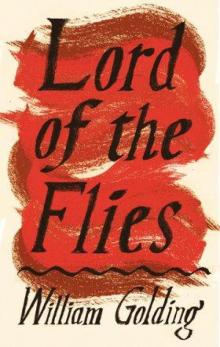 Lord of the Flies
Lord of the Flies To the Ends of the Earth
To the Ends of the Earth Free Fall
Free Fall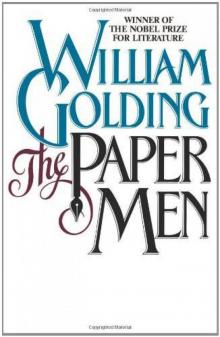 The Paper Men
The Paper Men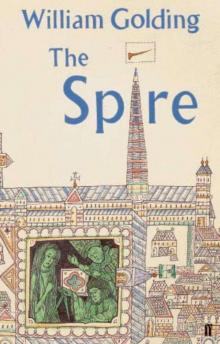 The Spire
The Spire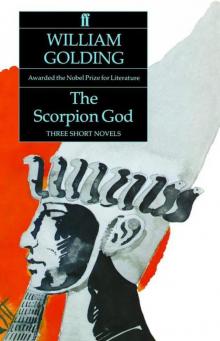 The Scorpion God: Three Short Novels
The Scorpion God: Three Short Novels The Inheritors
The Inheritors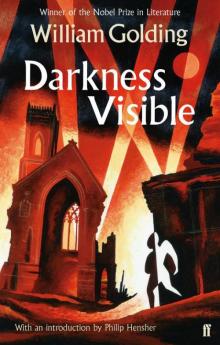 Darkness Visible: With an Introduction by Philip Hensher
Darkness Visible: With an Introduction by Philip Hensher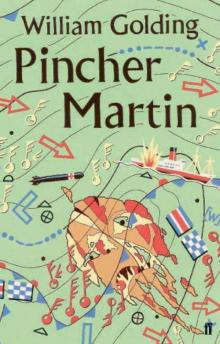 Pincher Martin
Pincher Martin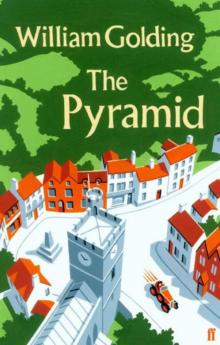 The Pyramid
The Pyramid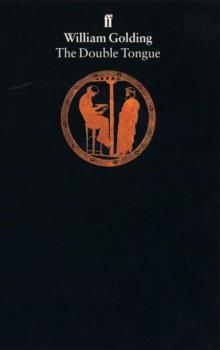 The Double Tongue
The Double Tongue An Egyptian Journal
An Egyptian Journal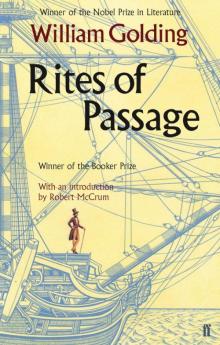 Rites of Passage
Rites of Passage Envoy Extraordinary
Envoy Extraordinary